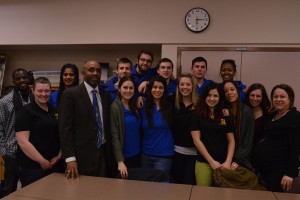University students bring new teaching methods to Tanzania

(Photo by David Dyck) Standing fourth from the left, Professor Andrew Allen poses in a group photo for the Teachers for Tanzania organization. Allen created the group in 2007 to meetwith the need for adequate teachers and supplies in Singida, Known as Tanzanian’s “forgotten city.”
Student teachers at the University of Windsor will spend three weeks in April bringing the twenty-first century Canadian school to Tanzanian orphans who are thirsty for knowledge.
Heading to Tanzania’s “forgotten city” Singida, 18 volunteers will spend their time instructing both teachers and students in schools suffering from out-dated teaching methods, language deficiencies and a need for supplies and qualified teachers.
In 2002, Tanzanian legislation eliminated primary school tuition. Free tuition led to schools becoming available to the masses, but not enough teachers or supplies came to meet the demands. In 2010, it was estimated there were approximately 54 students to every one teacher.
“They’re overworked, they’re swamped, the classrooms are large,” said Andrew Allen, a professor and the leading figure in the “Teachers for Tanzania” project, currently in its sixth year. “We’ve seen classes of 80, maybe 100 children.”
School resources are also in short supply. The group will be bringing pencils, erasers, markers, pencil crayons, rulers, protractors, compasses and other necessities with them.
Teachers are also dealing with what Allen describes as an “old-school British colonial system.”
“We notice when we go into the schools, the vast majority of classrooms do not have teachers, they have writing on the board,” said Elisa Graceffa, a member of the university’s alumni group who has been on two of the group’s past trips. “A lot of their teaching from what we’ve seen and experienced is very robotic, where the kids just repeat what the teacher tells them. They don’t necessarily know how to apply what they’re learning.”
That concerns Natalie Browning-Morgan, who has been to Tanzania on one of the trips.
“I remember in one classroom the teacher kept saying bell. Bell. Bell. She had a picture of a bell, but she never said, “Where’s the bell? Why do we use a bell? Where do we hear a bell?”
Teachers though, rather than being put off, say they are excited to teach new methods.
“We try to do different ways of applying knowledge through fun, making learning fun,” said Graceffa. “That way the kids can remember. We’re teaching the teachers different methods of teaching and knowing how to apply the knowledge.”
Students are also enjoying the new techniques. Attendance tends to be “spotty” during the year, but “shoots right up” when they know the Canadian teachers are coming.
Attendance problems also stem from the rural backgrounds the children come from with Chores and other responsibilities often taking priority over schooling.
When they ask the students what they want to be when they grow up, Allen said they are always surprised.
“What really blows us away when you ask them what they want to be is nothing different from what kids here would say. We hear doctors, lawyers, we hear a lot of teachers, airplane pilots, prime ministers, presidents.”
Allen remembers one boy named Baracka who nicknamed himself “Baracka Obama,” who recently developed aspirations to be president of Tanzania one day.
To face such a task though requires the mastery of kiingereza, otherwise known as English. Primary students are taught in the official language Kiswahili up to age 13, but upon entering secondary school, learning English becomes a must.
Alumnus student Kim Cox has been to Tanzania twice and said it can be difficult for students to shift abruptly from one language to another. This can lead to students unable to understand their assignments, due to language barriers.
“There is an issue, because the students write exams in English … they’re not necessarily understanding the questions and the content, even though the students are very bright.”
But for many residents, learning English may be the only way out of simple rural living.
“The folks there are connected to the world, they see what’s going on,” said Allen. “Knowing English is a tremendous advantage in terms of schooling, jobs and opportunities.”
To learn English takes resilience, which Allen said is one of the reasons he returns.
Along with resilience, Faisal Ishac, an alumni member, said he is impressed with the happiness and kindness which is commonplace in Tanzania.
“Here you ask people about their values, you still hear people say love, family, but then their actions might not reflect that. But over there, they reflect that 1,000 per cent,” said Ishac.
The teachers are also impressed by what they say is a “very respectful” culture.
“We buy food from the market and getting out of the taxi, the kids will drop what they’re doing and run to us and take the bags from us because we are adults, we’re not supposed to be carrying bags,” said Allen.
This attitude has rubbed off on several past volunteers, many of whom have said they have become more appreciative of the bounties of western culture upon coming back.
A definite reciprocal relationship has developed with the Canadians teaching the Tanzanian children who in turn are teaching them back. Both turn to their lives afresh, with new ideas and new plans for their future.
“I asked a student two or three years ago what he wanted to be when he grew up,” said Allen in what he said was the anecdote that has stuck out to him the most in the years he has gone. “He looked at me and said, “I wanna be just like you daddy. I wanna come back here and help orphaned children.”


